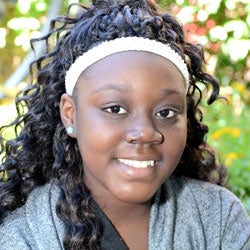Heart Failure
When Lakeshia Watson’s 12-year-old daughter, Nigeria, received the news that her cancer (osteosarcoma, a type of bone cancer) was in remission, she thought her daughter’s nearly year-long medical ordeal was over. But it wasn’t long before an even bigger problem came to light. Just a couple of months after going into remission, Nigeria went on a trip to Washington, D.C. While there, she began experiencing shortness of breath. “During the trip, she did a lot of walking, so we thought it was because of what she had gone through with the cancer, because she had to have a rod put in her leg, and she had a knee replacement,” Lakeshia said. “But after she got home, the problem continued, and then it got worse. Within a week of being home, you could see her chest jumping.” Unsure of what was going on, Lakeshia took Nigeria to a cardiologist in Mobile, where the family lives. The doctor quickly discovered that Nigeria’s heart was enlarged — probably as a result of the chemotherapy — and that she was at risk of a stroke. The local hospital didn’t have a team ready to assist so quickly, so they sent Nigeria immediately via Critical Care Transport to Children’s of Alabama. “It all happened so quickly, so there was really no time for us to process what was going on,” Lakeshia said. “But we were just thankful we could quickly get Nigeria into the hands of the doctors at Children’s.” At Children’s of Alabama, Nigeria’s team of doctors determined that she was in an advanced state of heart failure. The left side of her heart wasn’t functioning properly, so her body wasn’t getting the proper blood flow needed. Heart transplantation requires that a patient be in cancer remission for a number of years, depending on the type of cancer. Nigeria had only been in remission three months, so she wasn’t eligible for a transplant. Medicines weren’t making a significant impact with her heart, so doctors decided on a HeartWare® left ventricular assist device (LVAD). The team at Children’s was the first in the United States to report successful pediatric use of the device in 2012. The LVAD is surgically implanted underneath the heart and aids or replaces the failing left ventricle in getting blood to the aorta and the rest of her body. Although the LVAD is not something typically used with children, doctors knew it was her best option. “The doctors and staff at Children’s sat down and talked with me about Nigeria’s options, and after that, I knew the LVAD was the best thing for her,” Lakeshia said. “No one likes the idea of sending their child into open heart surgery, but anything else was too much of a risk.” “Modern ventricular assist device technology allows for the support of patients who have a chance to benefit from heart transplantation following treatment of conditions which may temporarily preclude transplantation,” said F. Bennett Pearce, MD, a Professor and Medical Director of Pediatric Heart Transplant, Advanced Heart Failure at UAB and Children’s. “These devices may extend the window and give hope to a group of patients that previously may not have benefited from transplantation.” Among the challenges in caring for patients on LVAD treatment is safely maintaining anticoagulation. Aiding in this task — and helping prevent Nigeria from experiencing a stroke due to the blood clots — was Children’s new TEG® machine, a highly specialized piece of equipment in Children’s laboratory that enables doctors to better understand a patient’s thrombotic risk. The Advanced Heart Failure Team at Children’s supervises the LVAD care and uses the TEG machine in ongoing management of her care. Less than three months after surgery, Nigeria was able to return home to Mobile. While Nigeria hasn’t been able to return to school quite yet — she has to stay with someone trained to manage the device at all times — she and her mother are adjusting to life with the LVAD and are hopeful about the device helping her heart to begin working on its own. “It felt so good to bring Nigeria home after so many weeks in the hospital,” Lakeshia said. “And we wouldn’t have been able to do that without the doctors and staff at Children’s. “We couldn’t have asked for a better place than Children’s. They were so attentive and helpful. They were truly concerned with Nigeria getting well and with making sure I was OK during the process. They took care of us both while we were there.”







